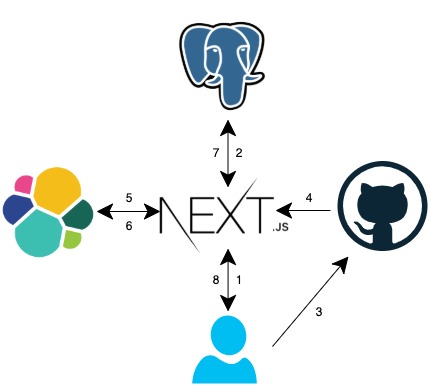Git-Based Blogging Platform for Developers
One of the problems I think developers have with existing blogging platforms is they feel they don't own their content. Articles are posted and stored in some faraway database, making it difficult to export their content should they want to move platforms.
My blogging platform idea is to use git to store content, in a decentralized fashion. Bloggers have full control of their content. Our centralized service would index bloggers' content and provide a beautiful UI to showcase and discover content.
Application architecture
Here's my opinionated way of building this:

- A developer signs up for our service, a web app built on Next.js, using GitHub auth. They'll add our GitHub integration to the GitHub repo they're using to store their content, written as markdown files, which will give our service read access to their repo.
- We'll create a user record in our PostgreSQL database. We'll use Postgres to store the user's liked posts, saved posts, or whatever other business logic is needed.
- Pushing content to
maintriggers our GitHub integration... - ...which will read their updated content...
- ...and index the content into ElasticSearch.
- Our Next.js app will read from ElasticSearch, allowing users to easily search for content...
- ...and read from Postgres to get any other business logic required by the app.
- We'll present a beautiful UI (styled with Tailwind CSS, of course!) to the user, providing an awesome reading and browsing experience.
Page structure
Here's how each page in the app could look:
/: the home page would present a search input, inspired by Google Search's UI, letting people quickly find the content they want. Scroll down and users can enjoy a nice browsing experience of categorized content, inspired by Netflix's UI./<GITHUB_USERNAME>: the profile page would showcase all blog posts and stats for a particular user./<GITHUB_USERNAME>/<MARKDOWN_FILE_NAME>: this page would show a particular blog post. The slug is the name of the markdown file in the repo.
Those are the big ones. From there, we could have other one-off pages like
/privacy-policy, /GITHUB_USERNAME/settings, etc.
Other considerations
Risk: is there a market for this?
As with any content based platform, this would require a network effect in order to take off. Maybe if some popular developer/writers started using the platform, it would incentive other developers to try it. Before building, get a pulse of potential users and see if there's any demand for this platform.
Security: is it safe?
Since our service is reading user-generated content from their GitHub repo, our service would need to prevent users from injecting malicious code into our app. We could use a library such as DOMPurify for example to prevent XSS attacks.
Monetization: can this be a sustainable business?
We could have a free tier and a paid tier.
With the free tier, we could run ads on the blog posts.
On the paid tier, your viewing experience is ad-free. Also with the paid tier, users can have the option to turn off ads on their posts or even run ads and monetize their own posts.
However, we need to make sure the ads don't detract from the user experience. Unfortunately, ads seem to be a necessary evil to monetizing content-driven apps.



